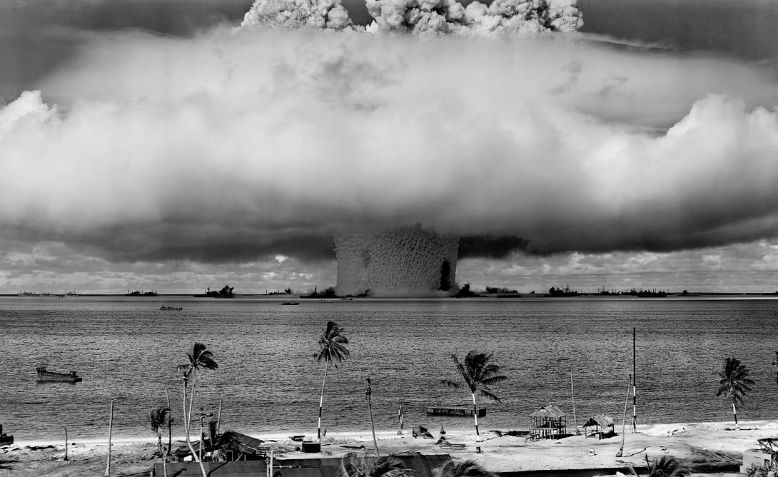 The testing of a nuclear weapon. Photo: Pixabay/WikiImages
The testing of a nuclear weapon. Photo: Pixabay/WikiImages
The desire to skewer Jeremy Corbyn over questions of war and peace seemingly knows no bounds, notes Lindsey German
The latest is Michael Fallon, Defence Secretary who announced that his government would be prepared to aggressively use nuclear weapons in a ‘first strike’. This neutral language disguises the reality that it means starting a nuclear war.
To gauge what kind of damage that would do just think about estimates of the effect of a nuclear strike on London. If a nuclear bomb the size of the first H-bomb at 10.4 megatons was dropped it would lead to 2.3 million deaths and 2.6 million injuries. It would have a fireball radius of 3.2 km which would hit from Camden Town to Brixton resulting in near 100% fatalities. Its radiation radius would be wider, leading to 50-90% casualties if without medical treatment (as most would be since several hospitals would be wiped out) who would die sometimes over weeks. There would be an air blast radius of 4.75 km from Chalk Farm to London Bridge which again would cause 100% fatalities. Lesser air blast would lead to the collapse of all buildings within a 10km radius. Thermal radiation would stretch for 29.1km.
That’s without the long term and immediate environmental effects. And there are much more powerful nuclear weapons. Is this what we would wish on the people of Moscow, or Pyongyang, or possibly Beijing.
Fallon and his media allies are preposterous. This isn’t going to be Dunkirk, or our finest hour, or even the Charge of the Light Brigade. This is a war with no winners. Does anyone trust a man who can enthuse over that?
Where’s Theresa?
Apparently, Theresa May is visiting Wales today. So far she’s not exactly been visible in this campaign. She is refusing to take part in televised debates, and all her visits so far have been in a cocoon of invited audiences and helicopter dashes. The strategy behind this is clear. The Tories are well ahead in the polls and close scrutiny of May is unlikely to improve that – indeed the general view seems to be that her angular and aloof style and her condescending vicar’s daughter demeanour will not do her any good.
On the other hand, she can’t stay in Downing St forever. The more Jeremy Corbyn gets out and about, however, the more crowds he seems to attract and the more natural he appears. Hence the attacks on him for weakness, niceness, and not wanting to annihilate humanity. How would we cope with a prime minister who didn’t want to go to war?
Those polls
Just a quick observation on the polls which put the Tories well ahead. Partly as a result of the UKIP vote going to them, and they seem high to me in Scotland and Wales. I’d be interested to know what people living there think. In Scotland, it seems they are picking up a unionist vote ie one that wants to resist independence and sees the Tories as the vehicle for doing so. In Wales probably that’s more to do with the decline of Ukip. But while I support some of the policies of both Plaid and SNP it does show you some of the problems when class is left out of the equation. Labour got trounced in 2015 in Scotland – quite rightly given their appalling position on the referendum and many other things – but now the main opposition seems to be the Tories. Not good.
What’s wrong with a Brexit that protects our rights?
Today’s attempt by Keir Starmer to explain Labours policy on Brexit is already being scuppered by Peter Mandelson (yet another argument for abolition of the House of Lords) and of course Tony Blair. Since everyone claims they don’t want a second referendum and therefore that Brexit will happen, what exactly is the beef here? And why should it make people even think of voting LibDem who are angling to be in coalition with the Tories again? Labour’s policy is an attempt to recognise the deep divisions that the referendum caused and to try to deliver Brexit without harming any of the existing rights of EU nationals living here, or any of the rights in EU law. Is that so hard to understand?

